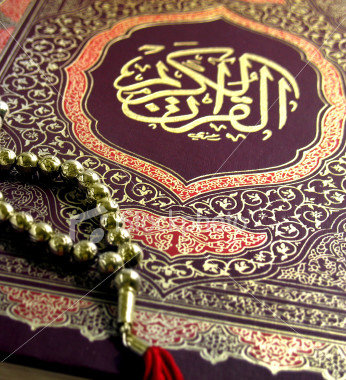Posts Tagged ‘Allah Taala’
I’m As my Slave Thinks of Me :: Beautiful Hadith !
“Allaah says: ‘I am as My slave thinks of Me’” Saheeh al-Bukhaari #7405
Shaykh ‘Abd ul-Muhsin al-’Abbaad (hafidhahullaah) comments:
“Meaning, a person should think good of his Lord, and he hopes and expects from Allaah that He will make his wish come true for him; and he should not be heedless or negligent or say ‘I called upon Him but He did not answer me,’ but rather he should have good thoughts of Allaah, ‘azza wa jal, and be persistent in supplicating to Him; he should not be lazy nor heedless. And Allaah, ta’aala, loves for His slaves to supplicate to Him, because du’aa is worship.
Thinking good of Allaah, ‘azza wa jal, is that a person asks Allaah, ‘azza wa jal, while hoping and expecting that Allaah, ‘azza wa jal, will answer him. So when he asks Allaah, ‘azza wa jal, he has good thoughts of Him, subhaanahu wa ta’aala. It does not come to his mind that He will not answer him, that He will not fulfill his wish; but rather, he should be sincere in his request and know that Allaah will be as His slave’s good thoughts of Him. So a person should ask Allaah, ‘azza wa jal, and be sincere and firm in asking; and he does not become doubtful or say ‘I will not be forgiven,’ but rather he should hope and expect that Allaah, ‘azza wa jal, will forgive him. And he should ask with sincerity and know that Allaah, ta’aala, responds to the supplication of the supplicant when he calls upon Him, and that He forgives the one who seeks His forgiveness. So he asks Allaah, ‘azza wa jal, persistently, and he has good thoughts of Allaah, subhaanahu wa ta’aala.”
Source: Sunan at-Tirmithee, Kitaabu z-Zuhd & Kitaabu d-Da’waat; tape no. 259/19 & tape no. 393/14


 [post this Article on your facebook wall,and share with friends.click above “Share” button …]
[post this Article on your facebook wall,and share with friends.click above “Share” button …]


[where ever you post,please add source link.either in website or even in facebook NOTE…please….spread the link of site..]

![]() Note:I’d love to see who visit my website,your views about website. Click here to leave your feedback.
Note:I’d love to see who visit my website,your views about website. Click here to leave your feedback.

- In: All | Allah الله | Islam | Mohammad | muhammad | Prophet Muhammad [pbuh] | Prophets | Quran
- 12 Comments
Understanding Allah, Jesus, and the Holy Spirit
Question:
Please explain clearly about these:
1. Who is Allah?
2. Who is God?
3. Who is Jesus?
4. Can I see all of them?
5. Whether they are all the same, since we say that Jesus, God and the Holy Spirit are the same.
6. Suppose I want to pray, how should I start praying?
Answer
Thank you for your questions. I would like to start out by saying that Muslims believe that all prophets of God preached the same simple truth of the One Sovereign God.
Who Is Allah? Who Is God?
Allah is God. The name Allah is the Arabic word for God. More precisely, it is the One Eternal Creator, Lord of the whole universe. It is the same Arabic name for God that is used in the Arabic Bible.
It is pronounced almost the same in other Semitic languages: “Eloha” in Hebrew, and “Allaha” in Aramaic. According to Jesus (peace be upon him), God is One, with no partner whatsoever. I quote the following verses from the Bible:
Jesus said to him, “Away from me, Satan! For it is written: ‘Worship the Lord your God, and him only.’” (Matthew 4:10)
“Well said, teacher,” the man replied. “You are right in saying that God is one and there is no other but him.” (Mark 12:32)
“The most important one,” answered Jesus, “is this: ‘Hear, O Israel, the Lord our God, the Lord is one.’” (Mark 12:29)
Who Is Jesus?
Jesus is one of a long string of prophets of Allah sent to all nations throughout history, starting from Adam, who received the first guidance from Allah, to the final one, Prophet Muhammad (peace be upon them all).
According to the Bible, Jesus was sent particularly to the Israelites, to set them back on the proper track of Moses. The Gospels record these words of Jesus:
“I am not sent but unto the lost sheep of the house of Israel.” (Matthew 15:24)
“Think not that I am come to destroy the law or the prophets: I am not come to destroy, but to fulfill. For verily I say unto you: ‘Till heaven and earth pass, one jot or one tittle shall in no wise pass from the law, till all be fulfilled.’” (Matthew 5:17-18)
The Qur’an, which Muslims consider the direct revelation says what means:
*{The Messiah (himself) said: O Children of Israel, worship Allah, my Lord and your Lord. Lo! whoso ascribeth partners unto Allah, for him Allah hath forbidden Paradise. His abode is the Fire. For evil-doers there will be no helpers.}* (Al-Ma’idah 5:72)
Jesus was a full human Prophet of God, as he emphatically declared:
“As it is, you are determined to kill me, a man who has told you the truth that I heard from God.” (John 8:40)
“What things?” he asked. “About Jesus of Nazareth,” they replied. “He was a prophet, powerful in word and deed before God and all the people.” (Luke 24:19)
Again, the Qur’an also affirms Jesus’s prophethood:
*{And when Jesus son of Mary said: O Children of Israel! Lo! I am the messenger of Allah unto you, confirming that which was (revealed) before me in the Torah}* (As-Saff 61:6)
In all aspects, the Gospels portray him as a human who was born and circumcised (Luke 2:5-7, 21, 40, 52, 11:27); who suffered hunger and thirst (Matthew 4:2, 11:19, 21:18); who got tired and slept like any human being (Matthew 8:20, 24-25, Luke 8:23, Mark 4:38, John 4:6); who was subject to human feelings of fear, astonishment, and sadness (Matthew 26:37, Mark 14:33-34, John 11:33, 35, 38); and who prayed to his Creator like any human believer does (Mark 1:35, 14:35, Luke 5:16, 6:12).
Logically speaking, having no father does not mean he was the son of God. Adam had neither father nor mother, yet both Adam and Jesus are bondsmen of Allah created by His will and power, by His word “Be” — Adam from earthly dust, and Jesus in the womb of Virgin Mary.
This is precisely and unequivocally defined in the Qur’an as follows:
*{The similitude of Jesus before Allah is as that of Adam; He created him from dust, then said to him: “Be”. And he was.}* (Aal `Imran 3:59)
So neither Jesus nor Adam is a son of God. References to Jesus in the Bible as son of God should not be taken in the literal sense, rather in the metaphoric sense of affection and nearness to God. Jesus himself affirms that we are all “sons” of God in this sense:
“Blessed are the peacemakers, for they will be called sons of God.” (Matthew 5:9)
“In the same way, let your light shine before men, that they may see your good deeds and praise your Father in heaven.” (Matthew 5:16)
Similar references to human beings as “sons of God” are also used in the Old Testament:
“You are the children of the Lord your God.” (Deuteronomy 14:1)
Finally, in his own words, Jesus declared himself as the Son of Man:
Jesus replied, “Foxes have holes and birds of the air have nests, but the Son of Man has no place to lay his head.” (Matthew 8:20)
“Just as Moses lifted up the snake in the desert, so the Son of Man must be lifted up.” (John 3:14)
Can We See God?
Our human capabilities are limited by the nature of our senses: vision in a certain wavelength range (4 to 7 X10-7 meters), hearing in a certain frequency range (2.500 to 4,000 cycles per second). Even the power of our instruments, however advanced, is limited in two ways:
■scale: by the huge universal dimensions in light years
■nature: to our detectable electromagnetic wave systems. So we cannot see or detect anything different from or beyond (in nature, time, or space) these systems: neither the angels nor any non-earthly being, nor God the Creator and Dominator of all His creation.
This is affirmed both in the Qur’an and in the Bible:
*{No vision can grasp Him, but His grasp is over all vision: He is above all comprehension, yet is acquainted with all things.}* (Al-An`am 6:103)
“Ye have neither heard his voice at any time, nor seen his shape.” (John 5:37)
Are God, Jesus, and Holy Spirit the Same?
First: who is the Holy Spirit? A careful reading of the Gospels clarifies that the Holy Spirit is the Angel Gabriel.
Compare the two narrations of Matthew and Luke:
Now the birth of Jesus Christ was on this wise: When as his mother Mary was espoused to Joseph, before they came together, she was found with child of the Holy Ghost. (Matthew 1:18)
And in the sixth month the angel Gabriel was sent from God unto a city of Galilee, named Nazareth, to a virgin espoused to a man whose name was Joseph, of the house of David; and the virgin’s name was Mary. (Luke 1:26-27).
This accords with the Qur’an:
*{Then We sent her our angel [literally, spirit], and he appeared before her as a man in all respects. … He [the angel] said: “Nay, I am only a messenger from thy Lord, (to announce) to thee the gift of a holy son.”}* (Maryam 19:17,19)
So God the Lord, Jesus the human prophet, and the Holy Spirit Gabriel are each separate. The doctrine of the Trinity was never preached by Jesus, nor by his followers for three centuries. The word ”trinity” is nowhere in the Bible. The whole concept was derived from the words of John, who never met Jesus.
The myth of trinity gradually crept into Christianity, influenced by pagan beliefs and Greek mythology, and was adopted by Council of Nicaea in 325 CE.
“How Can I Start Praying?”
The answer to this, James, really depends on you and the choices you make in your life. If you fully accept Islam, that is, belief in the One God, and the message revealed to Prophet Muhammad through the miraculous word of God, the Qur’an, this would be your first honorable step to the truth of Islam.
The following steps are straightforward, and can be taken without any intermediary or clergy. It is something between you and your Creator, yet in the way He ordained. You can find the necessary details in the links provided below; and you could better still refer to a trustworthy Islamic Center for guidance and support.
Best wishes for you on this most blessed trip to the pure Divine Truth.


 [post this Article on your facebook wall,and share with friends.click above “Share” button …]
[post this Article on your facebook wall,and share with friends.click above “Share” button …]


[where ever you post,please add source link.either in website or even in facebook NOTE…please….spread the link of site..]

![]() Note:I’d love to see who visit my website,your views about website. Click here to leave your feedback.
Note:I’d love to see who visit my website,your views about website. Click here to leave your feedback.

Seek no audience for your deeds other than
Allah(SWT)

Ikhlaas according to Al-Jurjaani (rh) said that it is to not seek any audience for your deeds other than Allah.
Remember what Ibnu al-Qayyim said: Any action we do is subject to three defects:
1) Being conscious that others are observing our actions
Ya’qoob al-Makfoof (rh) used to say, “The sincere one is he who hides his good deeds in the same way that he would hide his bad.”
2)Seeking a return (benefit/reward) for the action
Do we act the same in private as we do in public i.e. as much zeal with qiyaam as with loading for flood appeal/fundraising?
3)Being satisfied with our actions
Dont forget that tawfique to do anything is only from Allah(SWT)
Ibn Al-Qayyim (rh) said, “Deeds without sincerity are like a traveler who carries dirt in his water. The carrying of it burdens him and it brings no benefit.”


 [post this Article on your facebook wall,and share with friends.click above “Share” button …]
[post this Article on your facebook wall,and share with friends.click above “Share” button …]


[where ever you post,please add source link.either in website or even in facebook NOTE…please….spread the link of site..]

![]() Note:I’d love to see who visit my website,your views about website. Click here to leave your feedback.
Note:I’d love to see who visit my website,your views about website. Click here to leave your feedback.

- In: All | Allah الله | Islam
- 14 Comments

How to Know If Allah is Pleased with You?

Among the signs that the Lord is pleased with His slave is that He guides him to do good deeds and avoid haraam things. This is confirmed by the words of Allaah:
“While as for those who accept guidance, He increases their guidance and bestows on them their piety” [Muhammad 47:17]
“As for those who strive hard in Us (Our Cause), We will surely guide them to Our paths (i.e. Allaah’s religion — Islamic Monotheism)” [al-‘Ankaboot 29:69]
But if a person is hindered from doing good deeds and avoiding haraam things – we seek refuge with Allaah – then that is a sign that Allaah is not pleased with him.
Allaah has also explained in His Book that the sign of His being pleased with His slave and of His guidance is that He opens his heart to true guidance and true faith. And the sign of misguidance and being far from the Straight Path is distress and constriction in the heart.
Allaah says (interpretation of the meaning):
“And whomsoever Allaah wills to guide, He opens his breast to Islam; and whomsoever He wills to send astray, He makes his breast closed and constricted, as if he is climbing up to the sky. Thus Allaah puts the wrath on those who believe not” [al-An’aam 6:125]
Ibn ‘Abbaas said, commenting on this verse: “And whomsoever Allaah wills to guide…”: He opens his heart to Tawheed and belief therein. Tafseer Ibn Katheer, 2/175
Another sign of Allaah’s love for His slave and His being pleased with him is that He makes him beloved to His slaves. Al-Bukhaari (3209) and Muslim (2637) narrated from Abu Hurayrah that the Prophet (peace and blessings of Allaah be upon him) said:
“When Allaah loves a person, He calls out to Jibreel: ‘Allaah loves So and so,’ so Jibreel loves him. Then Jibreel calls out to the people of heaven, ‘Allaah loves So and so, so love him.’ So the people of heaven love him and he finds acceptance on earth.”
Al-Nawawi said: “and he finds acceptance on earth” means that people love him and are pleased to see him, so their hearts incline towards him. It says in another report: “and he finds love on earth.”
And Allaah knows best.


 [post this Article on your facebook wall,and share with friends.click above “Share” button …]
[post this Article on your facebook wall,and share with friends.click above “Share” button …]


[where ever you post,please add source link.either in website or even in facebook NOTE…please….spread the link of site..]

![]() Note:I’d love to see who visit my website,your views about website. Click here to leave your feedback.
Note:I’d love to see who visit my website,your views about website. Click here to leave your feedback.

- In: All | Allah الله | Hadith/Sunnah | Islam | Prophets | Quran
- 2 Comments
Best Deeds Loved by ALLAH!
It is narrated on the authority of Abdullah bin Mas’ood (may Allah be pleased with him), who observed:
“I asked Allah’s Messenger (may peace be upon him) which deed was the best.” He (the Holy Prophet) replied: ‘The Prayer at its appointed hour.’ I (again) asked: “Then what?” He (the Holy Prophet) replied: ‘Kindness to the parents.’ I (again) asked: “Then what?” He replied: ‘Earnest struggle (Jihad) in the cause of Allah.’ I refrained from asking any more questions for fear of annoying him. (Sahih Muslim: 120)
Abu Hurairah (may Allah be pleased with him) reported that Allah’s Messenger (may peace be upon him) was asked about the best of deeds. He observed: “Belief in Allah.” He (the inquirer) asked: ‘What next?’ He (the Holy Prophet) replied: “Jihad (struggle to the utmost) in the cause of Allah.” He (the inquirer) again asked: ‘What next?’ He (the Holy Prophet) replied: “Pilgrimage accepted into the grace of the Lord.” (Sahih Muslim: 118)
Abu Dharr (may Allah be pleased with him) reported that I asked the Messenger of Allah:
“Which of the deeds is the best?”
He (the Holy Prophet) replied:
‘Belief in Allah and Jihad in His cause.’
I again asked: “Who is the slave whose emancipation is the best?”
He (the Holy Prophet) replied: ‘One who is valuable for his master and whose price is high.’
I asked: “What if I cannot afford to do it?”
He (the Holy Prophet) replied:
‘Help an artisan or make anything for the unskilled (laborer).’
I (Abu Dharr) said:
“O Messenger of Allah, you see that I am helpless in doing some of these deeds.”
He (the Holy Prophet) replied:
‘Desist from doing mischief to the people. That is your own charity for your self.’
(Sahih Muslim: 119)
SOME OF THE HUMAN QUALITIES ALLAH, THE ALMIGHTY LOVES
“Say (O Muhammad to mankind): “If you (really) love Allah, then follow me (i.e. accept Islamic monotheism, follow the Quran and the Sunnah), Allah will love you and forgive you your sins. And Allah is Oft-Forgiving, Most Merciful.” (Quran: 3:31)
Patience
“And Allah loves as-Sabirun (the patient).” (Quran: 3:146)
Justice and Dealing with Equity
“Be just: that is nearer to piety; and fear Allah.” (Quran: 5:8)
Putting Trust in Allah
“Certainly, Allah loves those who put their trust (in Him).” (Quran: 3:159)
Perfection of One’s Work
The Messenger (peace be upon him) said: “Allah loves that if one does a job he perfects it.”
Rescuing
Abu Ya ‘la Dailami and Ibn Asakir narrated: Abu Hurairah and Anas Ibn Malik said: Allah’s Messenger (peace be upon him) said: “Allah loves rescuing the one who needs rescue.”
Being Kind and Gentle to Others
Baihaqani narrated: Allah’s Messenger (peace be upon him) said: “Allah is kind and gentle (to others).”
Kindliness
“Aisha narrated: The Messenger of Allah (peace be upon him) said: “Allah loves kindliness in all matters.” (Bukhari)
Repentance
“Truly, Allah loves those who turn unto him in repentance.” (Quran: 2:222)
Piety
“Verily, then Allah loves those who are al-Muttaqun (the pious).”
(Quran: 3:76)
Good-doing
“Truly, Allah loves Al-Muhsinun (the good-doers).” (Quran: 2:195)
Body Purification
“And Allah loves those who make themselves clean and pure [ i.e. who clean their private parts with dust (which has the properties of soap) and water from urine and stools, after answering the call of nature].” (Quran: 9:108)
Humility of the Rich
Muslim narrated: Sa’d Ibn Abi Waqqas said: Allah’s Messenger (peace be upon him) said: “Allah loves the believer who is pious and rich, but does not show off.”
Belief and Work
Al-Tabarani narrated: Allah’s Messenger (peace be upon him) said: “Allah loves the slave who believes and acquires a career (or work).”
Reflection of Allah’s Grace
Al-Tirmidhi narrated: Allah’s Messenger (peace be upon him) said: “Allah loves from amongst his slaves, the one who has a sense of zeal or honor.”
Magnanimity
Al-Hakim narrated: The Messenger of Allah (peace be upon him) said: “Allah is All-Generous and He loves generosity in sale, purchase and judgment.”
Virtuosity
The Messenger of Allah (peace be upon him) said: ” Allah loves the slave-believer who is poor but virtuous enough to refrain from begging though he has many children.” (Muslim and Ahmed)
Loftiness
Al-Tabarani narrated: the Messenger of Allah (peace be upon him) said: “Allah loves lofty matters and superiority and hates inferior matters.”
Justice
Allah’s Messenger (peace be upon him) said: “Allah loves that you be just toward your children even when kissing them.” (Ibn Al-Najjar)
Strength
Muslim narrated: Allah’s Messenger (peace be upon him) said: “The strong believer is better and more loved by Allah than the weak one, but they are both good.”
Love for the Sake of Allah
Al-Tabarani, Ibn Ya’la, Ibn Hibban and Al-Hakim narrated: Allah’s Messenger (peace be upon him) said: “If two men love each other for the sake of Allah, the stronger in love to his brother will be more loved by Allah.”
Forgiveness
Ibn Iday narrated: Allah’s Messenger (peace be upon him) said: “Allah is All-Forgiving and He loves forgiveness.”
Continuous Performance of Righteous Deeds
Bukhari and Muslim narrated: Allah’s Messenger (peace be upon him) said: “The best loved deeds to Allah are the ones that are continuous even if they are not very many.”
Loving and Visiting Believers
Malik narrated: Allah’s Messenger (peace be upon him) said: “Allah said: My love is due to those who meet for My sake, visit one another and make any effort for My pleasure.”
Exhortation and Advising
Abdullah, the son of Imam Ahmed narrated: It was said: Allah’s Messenger (peace be upon him) said: “The best loved slaves to Allah are those who exhort their slaves.”
Love of Virtuous Deeds
Ibn Abi Al-Dunya narrated: Allah’s Messenger (peace be upon him) said: “The best loved slaves to Allah are those who are made to love virtue and loving virtuous deeds is made lovely to them.”
Good Manners and Conduct
Al-Tirmidhi narrated: Allah’s Messenger (peace be upon him) said: “The best loved by me and the nearest to me on the seats on the Day of Resurrection are those who have the best manners and conduct amongst you, who are intimate, are on good terms with others and are humble, and the most hated by me and who will be on the furthest seats from me are those who are talkative and arrogant.”
Love of Allah is the basis of worship that should be directed to Him alone. Any other love should be for His sake too. The real love of Allah is to do whatever He ordained and to abandon whatever He forbade, in addition to following the Prophet’s Sunnah.
Whoever obeys someone or something other than Allah and His Messenger, or follows any saying other than theirs, or fears other than Allah or seeks the pleasure of other than Allah, or puts his trust in other than Him, does not love Allah, nor does he love His Messenger. Muslims should also love one another and wish the best for one another.
Allah’s Messenger (peace be upon him) said:
“One will not be a true believer unless he loves for his brother what he loves for himself.” (Bukhari, Muslim, Nasa’i, Ahmed and Ibn Majah)
Imam Malik and Imam Ahmed narrated:
Allah’s Messenger (peace be upon him) said:
Allah said: My love is due to those who love one another for My sake.”
And put thy trust in Allah, and enough is Allah as a disposer of affairs.(Holy Qu’ran 33:3)











































 Oh Allah,Please Forgive me
Oh Allah,Please Forgive me Ex-Christians-Now Muslim,Alhamdulillah
Ex-Christians-Now Muslim,Alhamdulillah I Love My Prophet Muhammad s.a.w
I Love My Prophet Muhammad s.a.w
















![Fake Grave of Prophet Muhammad [pbuh]](https://islamgreatreligion.files.wordpress.com/2009/07/prophet_muhammad_pbuh_tomb4.jpg)


















Recent Comments